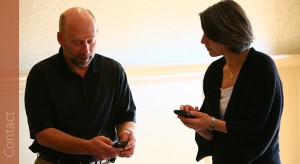
CONVERSATION. OPINION. EXCHANGE.
Interview with Cynthia Scherr
Russ Batzer, KCMX Newstalk (AM 880)
Thursday, April 29, 2010, 6–7 am
Cynthia Scherr has worked extensively with businesses, nonprofits, and government organizations. She works with leadership and senior management teams on strategic planning, organizational development, and managing change. Cynthia chairs two peer groups for CEOs and presidents of companies. Cynthia has an MBA from the Stanford Graduate School of Business, an MTS from Harvard Divinity School, and a bachelor’s degree from Oberlin College.
Q: Good Morning, Cynthia. Where did this all begin for you, and how did you end up in southern Oregon?
A: When I first flew into the Rogue Valley, I knew it was “home”—mountains, rivers, agriculture, diverse economy, friendly people, great place to raise kids. I moved here and decided to start my own business, which grew gradually. No one says they want to be a consultant when they grow up, but it happened rather naturally. I’ve got a background in venture capital, strategic planning, and helping businesses and organizations grow.
Q: Could you define what senior managers are within an organization? Owner, founder, president, CFO, COO, CMO: what is the range of people you work with?
A: I have worked with the full range, but I mostly work with leadership teams and CEOs to focus the direction and energy of a company: strategic planning, communicating the message to the rest of the company. Usually, I work with the main decision-maker because they are the person who decides they need a consultant. Sometimes, I’m involved with customer service training or communications training, which includes everyone in the company.
Q: So usually when do you receive a phone call to come help an organization? What is the aha moment for a business leader when they realize they need a consultant?
A: We joke that there are three reasons to hire a consultant: You need an outside perspective, you need specific expertise, or you need someone to blame. We try and avoid the last one.
Seriously, most companies realize they need a consultant when they are “stuck”—a consultant will help you figure out why you are stuck and how to move past it. It’s a little like being a doctor. The presenting issue (the symptom) isn’t always the real issue (what’s causing the symptom). For example, the client says they consistently fall short of their new product introduction goals. After getting inside the company, you realize the head of R&D and the head of Marketing are not getting along—maybe because their incentives or their communication patterns are so out of synch with what the company wants to accomplish. My job is to tell the truth about the situation and help all of the players figure out how to solve it.
Q: What is the range of clients you work with? Meaning, do you work with businesses with four employees or only with businesses of 100 and above?
A: While I love the energy and enthusiasm of start-ups, most new businesses don’t know what they don’t know and until then, they don’t need a consultant.
There are several inflection points for businesses. One is the 10–15 employee or the $1-million mark—around that point, the founder realizes the skills that enabled them to be successful to that point won’t get them to the next level. About that point, businesses start bringing in outside expertise.
In general, I work with clients with anywhere from about a dozen to thousands of employees.
Q: How long do you work with a client on an average?
A: All depends. Some clients hire me annually to run their strategic planning process or to do a board retreat, which might be a day or two, and others hire me every year to run 360-degree reviews or board meetings.
Q: In your opinion, what do senior-level managers think are the biggest challenges in today’s marketplace?
A: I hear people gripe that there isn’t good talent available in the Rogue Valley—which I disagree with. Until very recently, demand has been down in so many industries, which is something harder to contend with.
Q: Now on the other side. From your perspective, what do you think are the biggest challenges facing senior-level managers? I am trying to show the difference between the mindset of the senior-level manager and the perspective of you as the consultant of the senior-level manager. I am thinking these could be two totally different perspectives.
A: Discipline—we have so many distractions now—I face them myself. We have so much information, email, social media, etcetera that you could spend your whole day piddling around and never get anything done.
Jim Collins talks about what takes a company from Good to Great. The simplest formula is “disciplined people, disciplined thought, disciplined action.”
Going back to the gripe I hear about the lack of talent. Often, I find that senior managers have not taken the time to manage the talent they have well—define expectations, involve the employee in using their talents best, providing real-time feedback, and rewarding successful work. Usually taking the time to become a disciplined manager pays off in a productive employee.
Q: Off the top of your head, what are the top three areas managers need to focus on to shore up their organizations?
A: Manage your cash—we still don’t know if the shocks are over.
Look to the future—what are the trends or the breakthroughs in your industry?
Focus more on planning than the plan.
Q: Is being a creative thinker important in the role of a senior-level manager during these tough economic times? Do people need to think out of the box and not do things like they’ve always done?
A: Absolutely! I’ve seen a lot of creativity during the recession—people redesigning their workflow, creative negotiation of contracts, questioning why they do everything, doing less with more—you can’t be complacent during a downturn.
Q: You have peer groups that you work with. How does this work, and what is the benefit of being part of a peer group rather than the one-on-one consultation format?
A: It’s very different from a one-on-one consulting engagement, which is project-based. You’ve heard the expression, “It’s lonely at the top” and maybe even felt it. CEO peer groups are a confidential forum with up to 12 CEOs of non-competing businesses who meet monthly to act as a sounding board for each other. Members share the best practices in their industry and coach each other through challenging issues. I also bring in guest speakers about three times a year. Usually you just find these groups in major metro areas. This model has been so successful that I now have two groups here—one that has been going for 12 years.
Q: Managing “change” is a big part of what you do with clients I am sure. During this rough economy, seems like every corner I turn, I am changing something in my business. What is your advice on managing change?
A: Be aware that often the boss or the management team have had a long time to get used to the change, but everyone else has not. It takes time to adapt, and there are whole cycles of change—whether the change is positive or negative—that people go through until they accept it.
Q: What are some of the big changes you have helped your clients with in their businesses?
A: Out of the basement mentality into the mainstream market. Strategic shifts from an industrial to a consumer market. Moving from one or two star performers to a team approach.
Q: How do you recommend communicating changes with employees?
A: Clearly, directly, simply. Let people know when change is coming, even if you haven’t defined it yet. If you don’t give people the straight story, they’ll make up one.
Q: If you could give only ONE important management tidbit to a business owner today, what would that be?
A: Besides manage cash? Learn to ask questions—of everyone: customers, employees, vendors. It’s the only way to stay in tune with reality.
Q: You teach at SOU, is that correct? How long have you been doing this? What are you seeing in the next generation of business leaders? Good things and concerns you may have?
A: I teach organizational leadership and presentation skills at SOU and have for the last three years—sometimes in Mexico and sometimes here. I’m excited about the drive many students have. They are better communicators in so many ways, less reserved, less formal, less hierarchical, used to working in groups.
I have some concerns about focus since they’ve been growing up multitasking and texting. All the brain research I’ve read says focused attention is more productive than jumping from one thing to the next.
Q: Where do you see your company in the next three to five years?
A: Providing full-service consulting in the Rogue Valley. I have a virtual network of consultants, including financial, marketing, and organizational development, and I should be able to provide whatever a client needs under one firm.
Q: If Governor Kulongoski was sitting here, what advice would you give him about businesses in our region? What do the small business owners need to achieve success?
A: Make sure we are represented in Salem. I’m glad to hear that you’re on the Oregon Small Business Advisory Council.
Small business owners need relief from huge healthcare cost increases. We don’t know yet know how healthcare reform will play out, but at least we have a start. Escalating healthcare costs is one of the biggest problems small business owners have faced over the last few years.
Q: Cynthia, what is the best way to reach you?
A: 541.552.0340.











